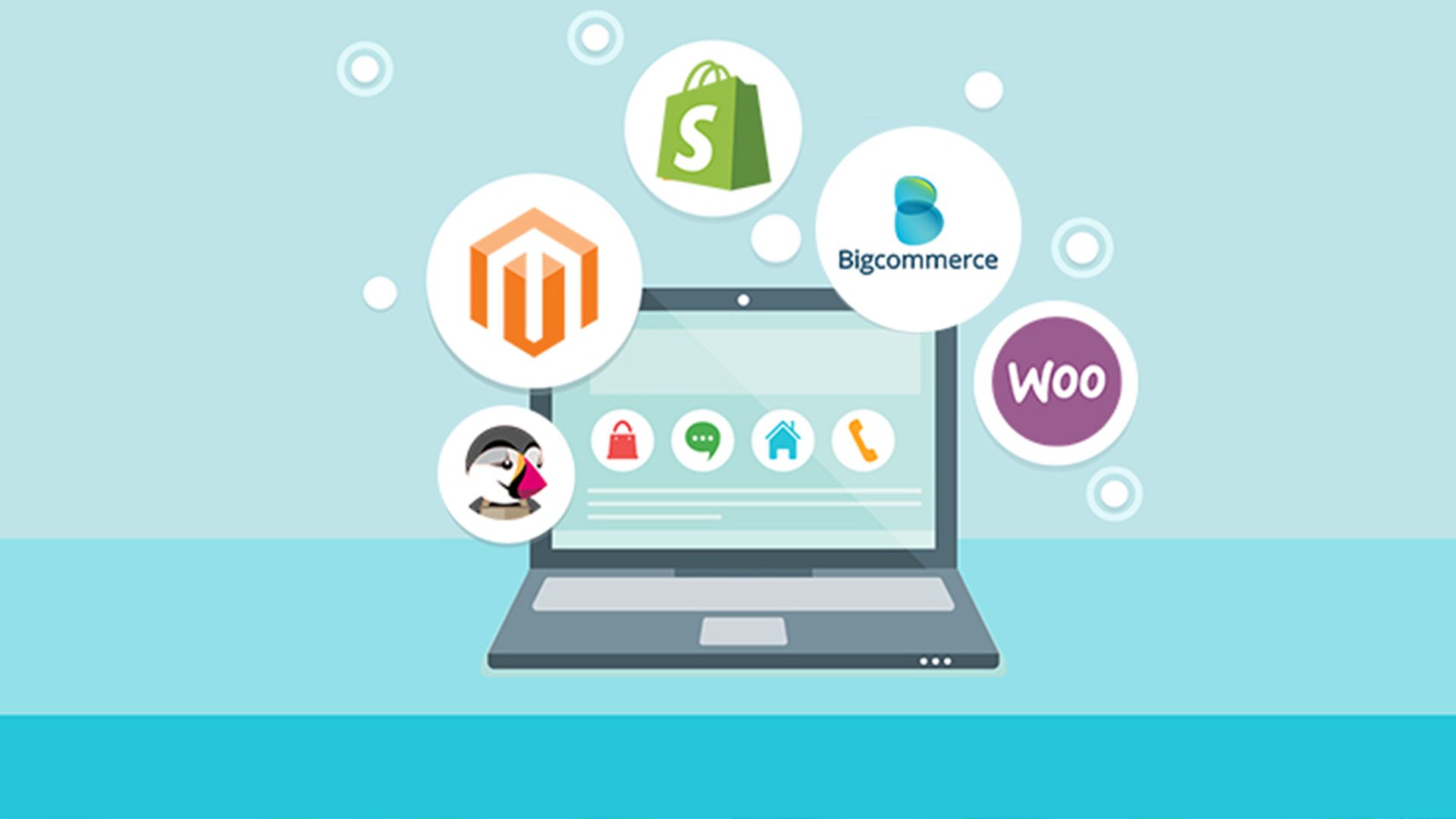Which Platform to Choose for an E-Commerce Website?

When choosing the right platform for your e-commerce website you need to consider the following things:
- How efficient the platform is?
- What are the functionalities that you expect from the platform?
- Is it user-friendly, secure and safe to use?
- How much does it cost?
- Does it offer fast page loading time?
- Does it provide a user-friendly environment?
- Is it flexible?
- What additional features that platform is offering?
- Are you going to get marketing tools?
- How you are going to get hosting?
- Will it be compatible with other software?
Using an open-source platform will require specialized expertise to modify your e-commerce website. You will need to study the programming language that these platforms are built-in. There is a steep learning curve if you’re custom build for your special purpose with feature-rich functionality. The better option is to hire freelancers or professional web development companies like IT Plus, which I recommend because it is one of the best e-commerce development company in Dubai to create one for you.
Did you know?
One important factor which determines your popularity among your customers is the heaviness or eCommerce website design. Shocked much? Well, this is indeed true. 21% of all the online customers are known to abandon your online store or market-place if your website loads too slowly or is heavy.
Some of the prominent e-commerce platforms are:
1 | WordPress (Woo-Commerce)
Description
Even though WordPress primarily a platform for a blog, it can convert to be a powerful e-commerce website with the woo-commerce plugin with the help of web development professionals. Woo-commerce is a fully-fledged e-commerce plugin that right from the installation your website will be ready-made e-commerce platform. It offers all the common features that are necessary for a successful e-commerce website.
Woo-commerce offers many customizations that are only possible through WordPress codex programming. And custom themes and plugins can be made using this and while enjoying the ease-of-use of WordPress you still can have a complex operating e-commerce website.
Pros
- Freedom of design and flexibility
- Minimal settings in which you can launch your website in a matter of hours.
- Tons of e-commerce themes and plugins available for extensive usage of your website.
- A vast community to help you with any stage of your website creation.
- Limitless functionality and extensibility options
- Great for SEO
Cons
- If you use more plugins the website tends to get slower due to the structure of WordPress coding.
- It is primarily a blog creating platform, so it has a certain limit even with customizations.
- Even though the core woo-commerce plugin is free, many extensions are not.
- Expert-level knowledge is required to add new functionality.
Did you know?
WordPress (WooCommerce) has 28.2% of the e-commerce market in 2019.
Who should use it
Anyone that is looking to start an e-commerce website which is basic and does not look for an upscaling.
Cost
There are many freelance developers and woo-commerce development companies that offer woo-commerce development. Prices vary depending on the requirements.
2 | Magento
Description
Magento is a web-based e-commerce platform that is open-source which provides online vendors with an adaptable shopping cart system, just as authority over the look, content, and functionality of their online store.
Despite the fact that Magento is a DIY site platform, its learning curve is very steep and on the off chance that you need to build a professional e-commerce site, at that point you are going to require help from the e-commerce development company. Since you will require the customization and that is just only possible through the programming in PHP in which Magento is based on.
Pros
- Fully Customizable and can make genuinely unique web stores.
- Scalable and flexible.
- Strong SEO.
- Multi-Store support
Cons
- It can be clunky with slow load times.
- It’s open-source, but unless you’re a coder bringing on talent to launch your store can be a time suck and cost an arm and a leg.
- You won’t discover specialized help past the forums
- If you are not comfortable with coding then you may find difficulty customizing the site and functionalities.
- Updates can be glitchy.
- Not very user-friendly backend.
Did you know?
Magento allows you to create e-commerce templates by yourself so you can address all your specific needs. However it takes some level of programming knowledge. So, if you’re not confident in your abilities, you can hire an e-commerce development company to do the hard work for you!.
Who should use it
Anyone that is looking to start a full-fledged, feature-rich, scalable e-commerce website can go for Magento.
Cost
Compared to other e-commerce platforms the cost of developing a Magento e-commerce website can be on the higher side due to the small developer community. There are many freelance developers and e-commerce development companies that offer Magento development. Prices vary depending on these companies.
3 | Shopify
Description
First up, Shopify is one of the most well-known eCommerce platforms on the planet. It’s very simple and quite easy to use, which makes launching a new store a breeze. It’s particularly appropriate to smaller brands with a low sales volume.
Shopify utilizes a single dashboard to oversee orders, shipping, and payments. This moderate methodology is ideal for new eCommerce owners.
What’s more, this platform offers tools to assist you with making and assemble your business from the beginning. It will assist you in registering a domain, design your site, and market your business. You’ll get support for running Google and Facebook advertisements, just as for including title tags, meta descriptions, and product details in your store. Shopify likewise offers its very own payment gateway (Shopify Pay), in spite of the fact that you can use other famous payment gateways like PayPal and Stripe (however Shopify charges extra on the off chance that you utilize an alternate gateway).
In case you’re searching for a platform that can do a great deal of the work for you and accompanies a lot of help, Shopify might be for you. Then again, on the off chance that you are overseeing higher sales volumes or are a more experienced seller, then you might need to think about different platforms.
Pros
- Very easy to get a store up and running
- Completely hosted so if you are non-tech you don’t need to get involved in the technical details of servers, hosting, etc
- Not bad for SEO (it’s improved)
- Reasonable support
- Very easy to customize if you know a little bit of web programming
Cons
- Meant for mainly North America/UK merchants – not so good for anyone else in terms of features/language availability
- No multi-language support
- A multi-page checkout can hurt conversions.
- Paid plugins can add up to the cost (even social media sharing)
- Limited payment gateways for the non-major markets (USA, Canada, UK)
Who should use it
Shopify can be used by any type of business – from small to multibillion-dollar businesses.
Cost
Shopify offers three pricing plans:
- The basic plan costs $29 per month.
- The main plan costs $79 per month.
- The advanced plan costs $299 per month.
- The fully hosted Plus platform costs $2,000 per month.
4 | BigCommerce
Description
BigCommerce is an e-commerce platform that enables you to create an online store. It lets you set up your store, add products, and make money through your site.
In any case, that is not all. BigCommerce is a specialized e-commerce builder, which means it’s intended to assist you with selling on the web. With huge amounts of built-in features, data tools, and that’s just the beginning, BigCommerce is best for large or fast developing organizations.
Pros
- Dedicated Hosting
- SEO friendly
- Bigcommerce has free and premium templates. They are responsive mobile friendly as well.
- Easy product management
Cons
- There might be issues while customizing your store
- It is a bit more expensive than WordPress.
- It does not have a free plan or a cheap entry-level plan.
Who should use it
If you are looking for an all-in-one e-commerce software platform, then you should consider Bigcommerce as it may be a great fit for your new or expanding online store.
Cost
- $29.95/ Month for the Standard plan
- $79.95/ Month for the Plus
- $249.95/ Month for Pro
Also Read: What E-Commerce Promises for the UAE in the Future
5 | OpenCart
Description
On the off chance that the greater price tag of Big Commerce is not feasible, you may go for OpenCart. It’s open-source and free-to-use, in spite of the fact that you can invest in add-ons, which run in cost from free to $100. There are many extra choices, some with features you would need to pay for somewhere else.
The platform likewise requires a lot of coding ability, since it’s exceptionally adaptable, but since their support isn’t as strong as in other platforms. In the case of something that turns out badly, you may need to tinker with your site yourself while OpenCart works on getting back to you.
All things considered, OpenCart has great SEO ability, is mobile-responsive, and can be the correct alternative for a tech-savvy small business owner who needs to save money on their foundation.
Pros
- It is lightweight which makes it faster than others
- It has simple UI and hence relatively simple to learn and manage
- Unlike others, it has an increasing number of inbuilt shipping and payment methods
- It has progressively more number of free modules and themes.
- Opencart has progressively more number of developers, in this way you get support easily.
- Opencart Development cost is similarly less expensive than others.
- Opencart consume fewer server assets and it’s easy to maintain
Cons
- Not appropriate for large scale organizations.
- Don’t give a large number of extravagant features like Magento.
- Since it is anything but difficult to adapt, low quality and vulnerable modules are available on the Internet.
- Cache management isn’t accessible out of the box.
Who should use it
OpenCart is one of the best choices for a basic e-commerce store.
Cost
Opencart is free. But for the e-commerce website development, you will need the help of professional web developers, in which the cost can vary depending on the requirement and the company.
5 | LARAVEL
Description
Although it doesn’t qualify for an e-commerce platform, Laravel is a PHP framework power-packed with a lot of features If you want to build a web application and are confused about which web framework to use, Laravel is the one to go! Laravel is one of the best web frameworks. Laravel aims to make the development process enjoyable. With Laravel, we can create web applications with a syntax which is very easy to use.
The amalgamation of features like secure authorization, high scalability, customizable along with wide community support has made Laravel one of the popular choices for eCommerce development.
Pros
- High Scalability
- Independent Operation
- Flexibility in Laravel Shopping Cart Management
- Omnichannel Support
- Easy database migration
- Inbuilt authentication and authorization
- Effective ORM
Cons
- Beginners may face problems while extending codes and classes.
- Many strategies included for the turn around routing are complex.
Did you know?
With a market penetration of 43% of share of all frameworks used in php, Laravel has been the most loved and adapted framework. The best e-commerce web development companies now use laravel for custom e-commerce development.
Who should use it
Anyone that is looking to start an e-commerce website that is scalable, feature-rich and easy to maintain.
Cost
There are many freelance developers and Laravel development companies that offer Laravel development. Prices vary depending on the requirement and the companies.
Conclusion
Choosing the right e-commerce platform for your Marketplace is always a challenge. Since the platform will serve as a backbone to your operation – it is important to choose a fitting option at once.
But there is a catch – while there are more than enough tips on how to choose this or that eCommerce platform – there are no one-size-fits-solutions that work no matter what.
So you should choose your e-commerce platform according to your requirements. If you need a simple website with minimal functionality, then you can go make your own using platforms like woo-commerce(minimal functionality), Shopify & bigcommerce website platforms but if you are serious and looking to build an online brand with some customized unique functionality then go with the custom web development in woo-commerce, Magento,open-cart & Laravel with the help of professional web development companies. Here is a guide about how you can find a good web partner.













